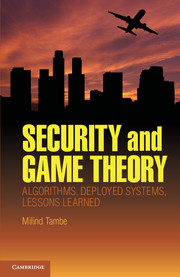Book contents
- Frontmatter
- Contents
- Acknowledgments
- 1 Introduction and Overview of Security Games
- PART I SECURITY EXPERTS' PERSPECTIVES
- PART II DEPLOYED APPLICATIONS
- PART III EFFICIENT ALGORITHMS FOR MASSIVE SECURITY GAMES
- PART IV FUTURE RESEARCH
- 10 Effective Solutions for Real-World Stackelberg Games: When Agents Must Deal with Human Uncertainties
- 11 Approximation Methods for Infinite Bayesian Stackelberg Games: Modeling Distributional Payoff Uncertainty
- 12 Stackelberg versus Nash in Security Games: Interchangeability, Equivalence, and Uniqueness
- 13 Evaluating Deployed Decision-Support Systems for Security: Challenges, Analysis, and Approaches
- PART V SHORT BIOS
- References
- Index
- References
12 - Stackelberg versus Nash in Security Games: Interchangeability, Equivalence, and Uniqueness
from PART IV - FUTURE RESEARCH
Published online by Cambridge University Press: 05 January 2012
- Frontmatter
- Contents
- Acknowledgments
- 1 Introduction and Overview of Security Games
- PART I SECURITY EXPERTS' PERSPECTIVES
- PART II DEPLOYED APPLICATIONS
- PART III EFFICIENT ALGORITHMS FOR MASSIVE SECURITY GAMES
- PART IV FUTURE RESEARCH
- 10 Effective Solutions for Real-World Stackelberg Games: When Agents Must Deal with Human Uncertainties
- 11 Approximation Methods for Infinite Bayesian Stackelberg Games: Modeling Distributional Payoff Uncertainty
- 12 Stackelberg versus Nash in Security Games: Interchangeability, Equivalence, and Uniqueness
- 13 Evaluating Deployed Decision-Support Systems for Security: Challenges, Analysis, and Approaches
- PART V SHORT BIOS
- References
- Index
- References
Summary
Introduction
There has been significant recent research interest in game-theoretic approaches to security at airports, ports, transportation, shipping and other infrastructure (Basilico, Gatti, and Amigoni, 2009; Conitzer and Sandholm, 2006; Kiekintveld et al., 2009; Pita et al., 2008). Much of this work has used a Stackelberg game framework to model interactions between the security forces and attackers. That is, the defender (i.e., the security forces) acts first by committing to a patrolling or inspection strategy, and the attacker chooses where to attack after observing the defender's choice. The typical solution concept applied to these games is strong Stackelberg equilibrium (SSE), which assumes that the defender will choose an optimal mixed (randomized) strategy based on the assumption that the attacker will observe this strategy and choose an optimal response. This leader-follower paradigm appears to fit many real world security situations. Indeed, Stackelberg games are at the heart two major decision-support applications: the ARMOR program in use at the Los Angeles International Airport since 2007 to randomize allocation of checkpoints and canine patrols (Pita et al., 2008), and the IRIS program in use by the U.S. Federal Air Marshals to randomize assignments of air marshals to flights (Tsai et al., 2009).
However, there are legitimate concerns about whether the Stackelberg model is appropriate in all cases.
- Type
- Chapter
- Information
- Security and Game TheoryAlgorithms, Deployed Systems, Lessons Learned, pp. 233 - 253Publisher: Cambridge University PressPrint publication year: 2011
References
- 9
- Cited by



